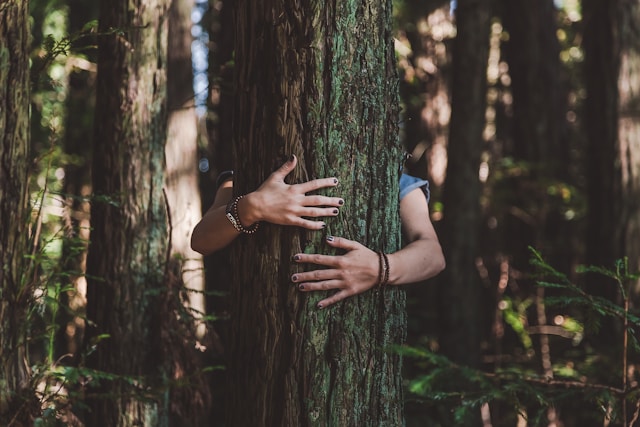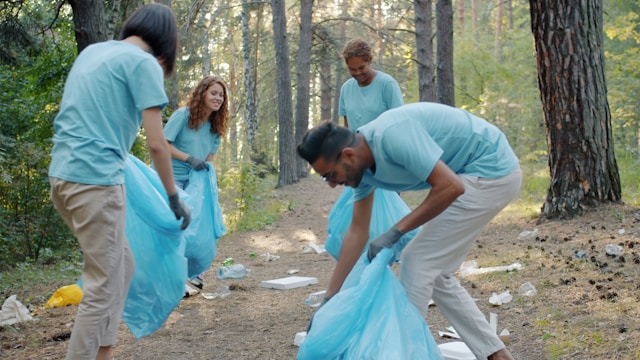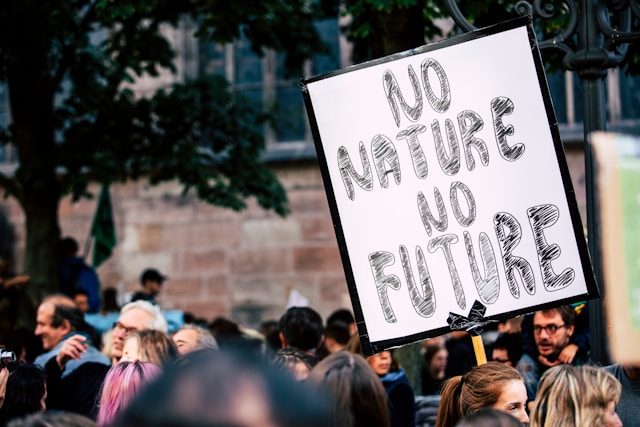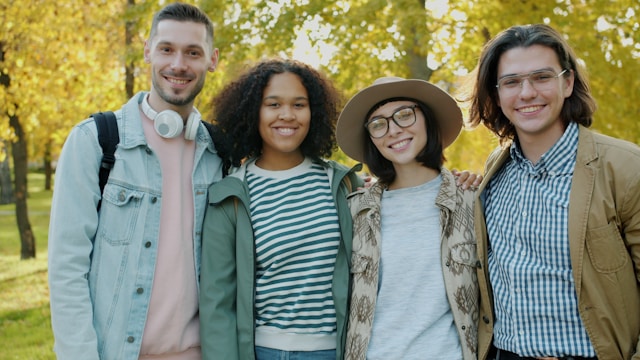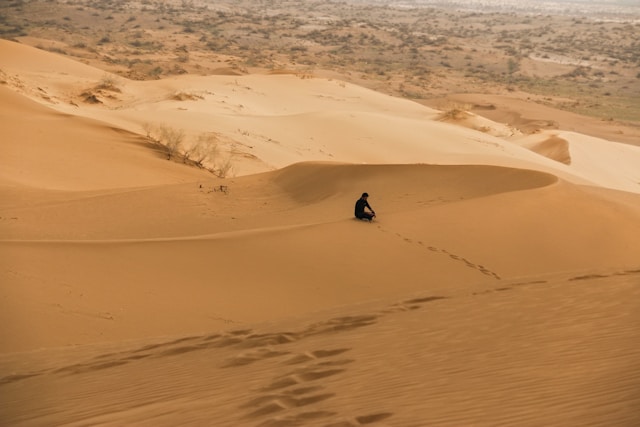When I was in grade school, we made time capsules, which we opened when we graduated from high school. I had written a letter to my future self, wondering “Will there still be pollution?”
Even decades ago, children were being taught about the destruction of our planet and had begun worrying about it, myself included. If only we had taken substantive action at that time. I feel sad and guilty about all that we might have done, and didn’t do.
While the terminology has changed from “pollution” to “climate change,” today our awareness of human’s impact on our world is at a new high. While increasing awareness is a good thing, it’s sad that it’s taken this level of crisis to get there.
One aspect of the climate emergency that gets overlooked is its impact on our mental health. We’re currently inundated with imagery that shows us: the world is not okay. On TV and social media, we see endless extreme weather events, forest fires destroying neighborhoods, ice storms cutting out electricity for weeks, and we know, things are starting to unravel, and it’s only the beginning.
It’s making us sad, scared, and anxious, particularly youth, who envision a future of doom. At Life Counseling Institute in Willowbrook and Park Ridge, we’re increasingly seeing clients who are struggling with eco-anxiety and climate grief, and we want you to know that you’re not alone, and that help is available.
Struggling with climate anxiety or eco-grief?
Our climate-aware therapists in Willowbrook and Park Ridge provide a safe space to process your feelings about climate change without judgment.
What the research tells us about climate anxiety
According to the Yale Program on Climate Change Communication, 73% of Americans think climate change is happening, and 68% are worried about it. A 2021 study of youth in ten countries revealed that:
- 59% of young people are extremely worried and 84% at least moderately worried about climate change
- 75% feel that the future is frightening
- 65% feel that governments are failing them and this is resulting in a loss of trust in governments
- 11% feel it is “too late to do anything”
And yet no one is talking about it.
No one is talking about how our basic sense of safety in this world is disrupted by these forms of collective trauma. And yet some, particularly our youth, are increasingly concerned about their future, given the urgency of the climate situation, and are getting anxious and depressed. Parents are concerned for their kids, grandparents for their grandkids. Our youth are thinking:
- What is the point of getting an education, when the world is coming to an end?
- Why should I work hard? I should live for the current moment as it’s all about to disappear.
- Can I justify bringing a child into this world, to face societal collapse?
These are heavy questions for anyone to carry, let alone young people who are just beginning to plan their futures.
Understanding eco-anxiety: a rational response to real crisis
Eco-anxiety was defined in 2017 by the American Psychological Association and ecoAmerica as ‘a chronic fear of environmental doom’ (APA & ecoAmerica, 2017). Importantly, this is not a mental health diagnosis but rather a term to describe rational emotional responses to the reality of climate change.
In her book Generation Dread: Finding Purpose in an Age of Climate Crisis, about the impact of climate change on youth, Britt Wray says:
“It is reasonable to be worried…It is appropriate to grieve…It is understandable to be scared…It is decent to rage… There is nothing pathological about this pain. It is an unavoidable symptom of a very sick society.”
To feel anxious about the future makes sense, and yet the fact that no one is talking about these feelings makes those who are struggling feel alienated and alone, questioning their perceptions. “How come no one else seems worried about this? Does that mean something is wrong with me?” Conversely, that might engender rage, “HOW COME NO ONE IS TALKING ABOUT THIS?”
Common emotions associated with climate anxiety
Some of the feelings that come about with climate anxiety include:
- Fear. A persistent sense of dread about what’s coming and whether we can stop it
- Rage. Anger at governments, corporations, and older generations for inaction
- Worry. Constant concern about the future, your children’s future, or whether to have children at all
- Guilt. Feeling responsible for your own carbon footprint or ashamed about past inaction
- Dread. A heavy, persistent sense that things will only get worse
- Sadness. Mourning the loss of natural spaces, species, or the future you imagined
- Despair. Feeling hopeless about humanity’s ability to address the crisis
- Grief. Mourning what has already been lost and what will be lost in the future
These feelings are all valid responses to what is happening in our world. If you’re experiencing them, you’re not broken. You’re awake.
Why traditional anxiety treatment doesn’t work for eco-anxiety
Because eco-anxiety is a natural response to what’s occurring in the world, it shouldn’t be considered a variant of typical anxiety, or “excessive worry.” Because it’s reasonable to feel anxious, when one seeks help for climate anxiety, they shouldn’t be treated as though their worries are excessive or unreasonable. And yet many therapists take the same approach to eco-anxiety as they do generalized anxiety, causing harm to their client.
Traditional anxiety treatment often focuses on challenging “irrational” thoughts or helping clients see that their worries are unlikely to come true. With climate anxiety, however, the concerns are based in reality. The climate crisis is real. The threats are documented. The future is uncertain. Telling someone their climate fears are “just anxiety” or trying to convince them things aren’t that bad is not only unhelpful, it’s invalidating and can damage the therapeutic relationship.
If you’re seeking help for climate anxiety, it’s important to know that therapists who are not climate-aware are sometimes struggling with their own feelings about the climate disaster. Some may be simply not aware of the degree of risk that humanity faces and minimize your concerns. Others may be struggling with increasing awareness of the climate crisis but coping through denial, and under those circumstances there may be a tendency to focus on what is wrong with you rather than face the reality of our current situation. The therapist may not want to hear more about climate change due to their own distress and may come across as minimizing or defensive.
Climate-aware therapists, conversely, have generally put in the work to explore their own feelings and have the capacity to stay present with the client’s own difficult emotions.
What to look for in a climate-aware therapist
When seeking therapy for climate grief or eco-anxiety, it’s important to find a therapist who understands that your feelings are a rational response to a real crisis. Here are some qualities to look for:
- Validation of your concerns. A climate-aware therapist will acknowledge that your worries are based in reality and won’t try to convince you that things aren’t as bad as they seem.
- Knowledge about the climate crisis. They should be informed about climate science and the psychological impacts of environmental disaster.
- Personal work on their own climate emotions. The therapist should have processed their own feelings about climate change so they can stay present with yours without becoming defensive or avoidant.
- Focus on empowerment rather than denial. Instead of minimizing your concerns, they’ll help you find ways to cope with difficult emotions while still staying engaged with the issue.
- Skills in grief and existential anxiety. Climate-aware therapy often involves processing grief for what’s been lost and what will be lost, as well as managing existential fears about the future.
- Understanding of collective trauma. They should recognize that climate change is a form of ongoing collective trauma that affects entire communities and generations.
How climate-aware therapy can help
Brynne Dochterman, Licensed Professional Counselor (LPC), a therapist at Life Counseling Institute who specializes in trauma and emotional regulation, explains her approach to working with clients experiencing climate distress:
“Eco-anxiety is a rational response to an overwhelming crisis. The first step is validation. We then use trauma-informed and somatic work to help the nervous system manage the overwhelm and ground the individual in what they can control, not what they can’t.”
This perspective is crucial because it recognizes that your body’s stress response to climate change isn’t a malfunction. Instead, it’s working exactly as designed when facing a real threat. Through trauma-informed therapy that includes somatic (body-based) techniques, you can learn to regulate your nervous system’s response to climate information while staying engaged with the issue in a sustainable way.
Fortunately, a good climate-aware therapist can help those who are struggling by providing a safe space free of judgment in which you can explore your feelings and learn ways to cope. While climate-aware therapy won’t erase your fears, it can help you with ways to relate differently to what you’re experiencing so that you can feel more empowered in dealing with your emotions and the climate crisis.
Climate-aware therapy can help you:
- Process your emotions without judgment. You’ll have space to express fear, anger, grief, and despair without being told these feelings are excessive or irrational.
- Develop coping strategies that honor reality. Rather than denying the crisis, you’ll learn skills to manage difficult emotions while staying engaged with the issue.
- Find meaning and purpose. Many people find that taking action, even small actions, helps them feel more empowered and less hopeless.
- Connect with others who share your concerns. Your therapist can help you find community with others who are climate-aware, reducing feelings of isolation.
- Balance hope and realism. You can learn to hold space for both the reality of the crisis and the possibility of positive change.
- Address related mental health concerns. Climate anxiety often co-occurs with depression, generalized anxiety, or existential distress, and therapy can address these as well.
- Navigate relationships with people who don’t share your concerns. It can be difficult when friends, family members, or partners aren’t as worried about climate change as you are, and therapy can help you manage these dynamics.
Practical strategies for coping with eco-anxiety
In addition to therapy, there are several strategies that can help you manage climate anxiety:
- Limit your media consumption. While staying informed is important, constantly consuming climate news can be overwhelming. Set boundaries around when and how much you engage with climate media.
- Take meaningful action. Many people find that getting involved, whether through advocacy, lifestyle changes, or community organizing, helps them feel less helpless. Even small actions can provide a sense of agency.
- Connect with others. Find community with people who share your concerns. This might be through environmental groups, climate grief circles, or online communities.
- Practice self-compassion. Remember that you didn’t create this crisis, and you’re not responsible for solving it alone. Be kind to yourself as you navigate these difficult emotions.
- Spend time in nature. Connecting with the natural world can be both grounding and motivating. It reminds us what we’re fighting to protect.
- Allow yourself to grieve. Grief is a natural response to loss, and climate change involves many losses. Give yourself permission to mourn.
- Focus on what you can control. While you can’t single-handedly stop climate change, you can control your own actions, your consumption choices, and how you show up in your community.
- Practice mindfulness. Mindfulness techniques can help you stay present rather than spiraling into anxiety about an uncertain future.
- Seek joy and beauty. It’s not selfish to experience moments of joy, connection, and beauty even in the midst of crisis. These experiences can sustain you.
Supporting young people with climate anxiety
If you’re a parent or educator concerned about a young person struggling with eco-anxiety, here are some ways to support them:
- Take their concerns seriously. Don’t minimize their worries or tell them not to think about it. Acknowledge that climate change is real and their feelings are valid.
- Encourage age-appropriate action. Help them find ways to get involved that feel meaningful to them, whether that’s school projects, youth climate groups, or family lifestyle changes.
- Model healthy coping. Show them how you manage your own climate emotions in healthy ways.
- Maintain hope without toxic positivity. It’s important to acknowledge both the seriousness of the situation and the possibility of positive change. Avoid false reassurances that “everything will be fine,” but also don’t catastrophize.
- Create stability in other areas. While the climate future may feel uncertain, you can provide stability through consistent routines, strong relationships, and secure attachment.
- Consider professional support. If a young person is showing signs of depression, severe anxiety, or hopelessness that interferes with daily functioning, consider seeking help from a mental health professional who understands climate anxiety.
Finding support at Life Counseling Institute
At Life Counseling Institute, our therapists understand that eco-anxiety and climate grief are rational responses to a real crisis. We provide a safe, non-judgmental space where you can explore these difficult emotions and develop healthy coping strategies. We offer both in-person sessions at our Willowbrook and Park Ridge locations, as well as telehealth counseling throughout Illinois.
Our approach integrates evidence-based therapies like Cognitive Behavioral Therapy (CBT) and Acceptance and Commitment Therapy (ACT) with a climate-aware perspective that honors your feelings and empowers you to cope with this ongoing crisis. Whether you’re a young person grappling with fears about your future, a parent worried about your children, or an adult struggling with guilt and grief about the state of our planet, we’re here to help.
Ready to Get Help?
If you’re struggling with eco-anxiety or climate grief, our team at Life Counseling Institute in Willowbrook and Park Ridge is here to help. We offer both in-person and telehealth counseling throughout Illinois.
Frequently asked questions about eco-anxiety and climate grief
Is eco-anxiety a mental illness?
No, eco-anxiety is not a mental illness or psychiatric disorder. It’s a rational emotional response to the very real threat of climate change. It is a chronic fear of environmental challenges but this fear is based in reality. However, when climate anxiety becomes so severe that it interferes with daily functioning, causes significant distress, or leads to depression or other mental health concerns, it’s important to seek support from a mental health professional. Climate-aware therapy can help you develop healthy coping strategies while validating that your concerns are legitimate.
How do I know if my climate anxiety needs professional help?
Consider seeking professional support if your climate anxiety is causing significant distress or interfering with your daily life. Warning signs include: persistent feelings of hopelessness or despair that don’t improve, difficulty sleeping or concentrating, withdrawal from activities you used to enjoy, strained relationships due to climate concerns, feeling paralyzed or unable to function, or thoughts of self-harm. Even if your symptoms aren’t severe, therapy can be helpful if you’re struggling to cope with climate emotions or feeling isolated in your concerns. A climate-aware therapist can provide tools and support to help you manage these feelings while staying engaged with the issue.
Can children and teenagers develop eco-anxiety?
Yes, children and teenagers can experience eco-anxiety, and research shows that young people are particularly vulnerable to climate distress. Studies have found that a majority of young people worldwide are extremely or very worried about climate change, with many reporting that these worries affect their daily life and future planning. Young people may express climate anxiety through fear about their future, anger at older generations, changes in career or family planning, difficulty sleeping, or reluctance to engage in long-term planning. Parents and educators should take these concerns seriously while providing age-appropriate information and opportunities for meaningful action. If a young person’s climate anxiety is severe or persistent, consider seeking help from a mental health professional who understands these concerns.
What’s the difference between eco-anxiety and generalized anxiety disorder?
The key difference is that eco-anxiety is a response to a real, external threat (climate change), while generalized anxiety disorder involves excessive worry about many things that may or may not be realistic threats. People with generalized anxiety disorder worry excessively about everyday concerns and often recognize that their anxiety is out of proportion to the actual risk. With eco-anxiety, the concerns are based in reality and the anxiety is proportionate to the actual threat. This is why traditional anxiety treatments that focus on challenging “irrational” thoughts don’t work well for eco-anxiety. However, someone can have both eco-anxiety and generalized anxiety disorder, and a skilled therapist can help address both issues appropriately.
How is climate-aware therapy different from regular therapy?
Climate-aware therapy differs from traditional therapy in that it validates your climate concerns as rational rather than treating them as excessive or irrational worry. A climate-aware therapist has done their own work to process their feelings about climate change, so they can stay present with your emotions without becoming defensive, minimizing your concerns, or pushing you toward denial. The focus is on helping you develop healthy coping strategies that allow you to acknowledge the reality of the crisis while still finding meaning, taking action, and maintaining your mental health. Climate-aware therapy often incorporates grief work, existential therapy, and strategies for coping with ongoing collective trauma, rather than just trying to reduce your anxiety symptoms.
Can I still have hope while experiencing climate grief?
Yes, and in fact, holding space for both grief and hope is an important part of climate-aware coping. You can acknowledge the reality of what we’ve lost and what we may lose while also recognizing that there are still opportunities for positive change. Hope doesn’t require certainty about the future or belief that everything will be fine. Instead, it can be an active choice to stay engaged and keep working for a better outcome even in the face of uncertainty. Many people find that taking action, connecting with others who care, and focusing on what can still be protected or restored helps them maintain hope alongside their grief. A climate-aware therapist can help you navigate this balance without falling into either denial or complete despair.
What can I do right now if I’m struggling with eco-anxiety?
If you’re experiencing eco-anxiety right now, here are some immediate steps you can take:
- First, remind yourself that your feelings are valid and you’re not alone in experiencing them.
- Second, consider limiting your exposure to climate news for the rest of the day to give yourself a break.
- Third, reach out to someone who understands your concerns, whether that’s a friend, family member, or online community.
- Fourth, if possible, spend some time in nature or doing something that brings you joy or peace.
- Fifth, consider taking one small action that feels meaningful to you, whether that’s signing a petition, making a sustainable choice, or learning about a climate solution.
- Finally, if your distress is severe or persistent, consider reaching out to a mental health professional who specializes in climate anxiety. You can contact Life Counseling Institute at (630) 269-2886 to schedule an appointment with a climate-aware therapist.
You Might Also Find it Helpful to Read:
- 10 Daily Habits That Can Reduce Your Anxiety
- Are You Enabling Your Child’s Anxiety?
- How Counseling For Anxiety Can Help You
Citations:
- American Psychological Association & ecoAmerica. (2017). Mental health and our changing climate: Impacts, implications, and guidance. https://www.apa.org/news/press/releases/2017/03/mental-health-climate.pdf
- Leiserowitz, A., Maibach, E., Rosenthal, S., Kotcher, J., Goddard, E., Carman, J., Myers, T., Verner, M., Marlon, J., Goldberg, M., Ettinger, J., Fine, J., & Thier, K. (2024). Climate Change in the American Mind: Beliefs & Attitudes, Fall 2024. Yale University and George Mason University. New Haven, CT: Yale Program on Climate Change Communication.
This article was originally written by Life Counseling Institute founder Marilee Feldman, LCPC, CADC. Marilee is Illinois Regional Coordinator for Climate Psychology Alliance and is a trained Climate Reality Leader through the Climate Reality Project. This article was substantially updated in October 2025 and clinically reviewed by Zuly Ramirez, Licensed Clinical Professional Counselor (LCPC).

